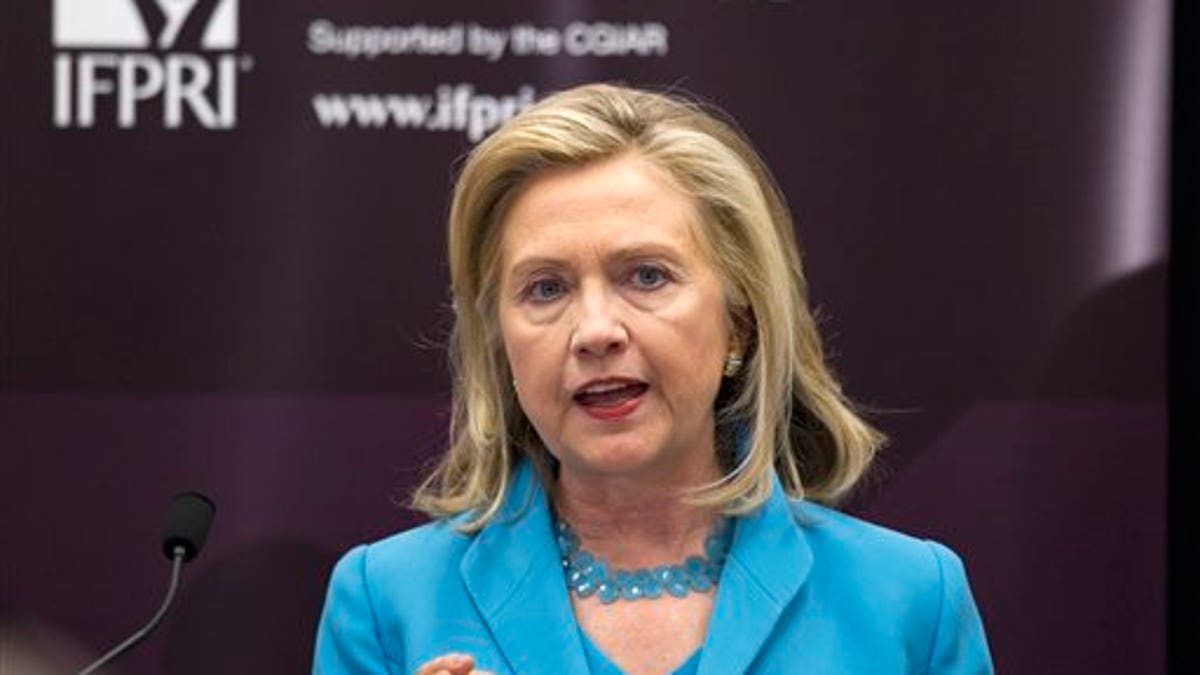
August 11: Secretary of State Hillary Rodham Clinton during a speech on the humanitarian crisis in East Africa at the International Food Policy Research Institute in Washington. (AP)
WASHINGTON – Secretary of State Hillary Rodham Clinton on Thursday described the severe drought threatening more than 12 million Africans with starvation as a stark reminder of the need to invest in global agriculture and nutrition — Obama administration goals that could be sharply limited if House Republicans get their way.
In a speech at the International Food Policy Research Institute, Clinton announced that the United States was providing another $17 million in emergency food aid to the Horn of Africa, with $12 million going to humanitarian operations in Somalia. That brings total U.S. assistance to the region to more than $580 million this year.
But Clinton stressed that the famine must prompt long-term thinking by governments and charities to avoid future food crises. Aid shouldn't only be about providing help during catastrophes, but also about boosting agriculture, nourishment levels and food distribution networks around the world so that future catastrophes can be avoided.
"While we hurry to deliver life-saving assistance, we must also maintain our focus on the future by continuing to invest in long-term food security in countries that are susceptible to drought and food shortages," she said. The basic idea is that teaching people to feed themselves means less need for emergency — and more expensive — operations later.
Clinton has her work cut out for her at home. Although she never mentioned Congress, the House Appropriations Committee has proposed steep cuts in foreign aid funding. Money for the U.S. Agency for International Development, which pays for much of the government's humanitarian assistance, would fall by $488 million to $1.04 billion. That would be $705 million below the funding request made by President Barack Obama.
At a round table discussion with reporters Wednesday, USAID Deputy Administrator Don Steinberg warned that the proposed cuts would hurt the agency's ability to improve resilience in the developing world through safety net and food-for-work programs. Sam Worthington, the president of InterAction, an umbrella group of U.S. aid organizations, said there was a "disconnect" in Congress in its discussions about foreign aid and what is happening in the Horn of Africa.
"We can't watch people starving to death," Worthington said.
The United Nations warned Wednesday the famine hasn't peaked. The long-running drought has been exacerbated by the Islamic militant group al-Shabab's refusal to allow many aid groups to deliver supplies in parts of Somalia it controls. Thousands of children have already died and more than a million Somalis have fled their homes in search of food.
The crisis is also severely affecting Ethiopia, Kenya and Djibouti, where millions more need support.
Clinton said the situation could have been even worse had monitors not warned governments ahead of time about escalating drought and crop conditions. The U.S. was able to pre-position food in key locations last year to prepare for the likelihood of local shortages. And as a result, less than 5 million need food in Ethiopia, "an unacceptably high number" but far below the 13 million during the last drought in 2002-2003, she said.
The biggest problem has been Somalia, which Clinton described as the "epicenter of the emergency." Unlike its neighbors, the country has no effective national governance. Insecurity linked to al-Shabab's fighting and previous killings of aid workers has made operating in the country extremely difficult.
Clinton said the U.S., nevertheless was now providing $92 million in assistance inside Somalia, and has relaxed anti-terror laws to make it easier for aid groups to deliver help. Previously, they potentially faced American prosecution if forced to pay bribes or taxes to al-Shabab, which the U.S. has designated a terrorist organization.
"But as we proceed, we must not forget that we have seen crises like this before," Clinton said. "First comes a severe drought. Then crops fail, livestock perish, food prices soar, thousands of people die from starvation — most of them children — and thousands more pick up and move. Every few decades, the cycle repeats."
To break the cycle, Clinton said agricultural systems must be improved so that they produce enough food and income in good times, and don't completely break down when nature or economics bring worse times. Infrastructure, better governance, markets and education are needed, she said.
"A hunger crisis is not an act of God," Clinton said. "We have the know-how, the tools, the resources and increasingly we have the will to make chronic food shortages and under-nutrition a memory for the millions worldwide who are now vulnerable to them."

